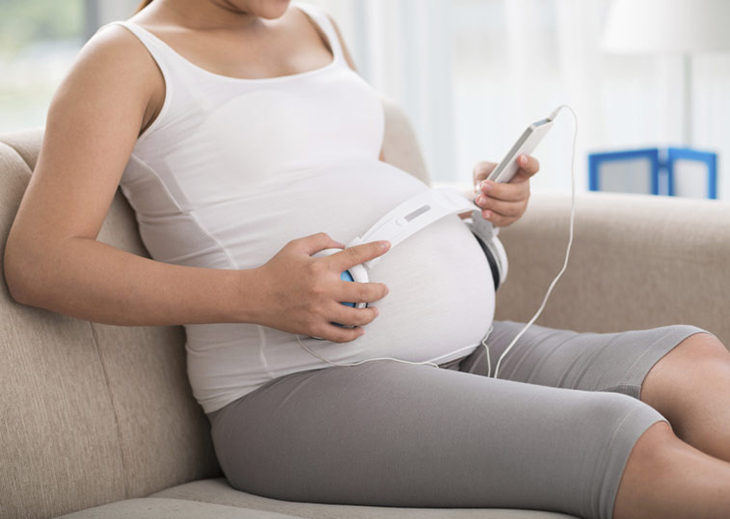What is prenatal education through music?
Prenatal education, also known as nurturing the baby in the womb, is expressed through two factors: good nutrition and good education. Scientists believe that the fetus can understand and receive the messages and emotions transmitted by the mother.
To ensure good prenatal education, mothers need to ensure adequate nutrition, a relaxed spirit, a healthy lifestyle, and avoid using substances that stimulate the baby. Many families believe that educating children starts at the age of 1, but prenatal education is an early education process when the baby is still in the womb.

In fact, there are many ways to prenatal educate, and prenatal education through music is the most widely used method. Prenatal education through music is the use of music for both the mother and the baby to listen to, helping the mother to always feel comfortable and stimulating the baby’s brain development, enhancing auditory sensitivity.
More importantly, it helps the baby develop the ability to perceive and enjoy music. Mothers can start from the 24th or 25th week of pregnancy because this is the time when the auditory transmission system of the unborn baby has developed completely.

The effects of prenatal education
Prenatal education has a great impact on the development of the child in the womb. Here are some effects of prenatal education:
- Enhance the emotional bond between parents and the baby.
- The baby develops comprehensively in both physical and mental aspects while in the womb.
- Parents will expand their knowledge in child-rearing for the present and the future.
- The baby will develop better language skills.
- The baby’s IQ develops.
- The baby will respond well to any situation or problem.
- Expand knowledge, increase the child’s understanding and emotions.
- Reduce the risk of maternal depression.
- Help the mother feel comfortable and always happy during pregnancy.

Misconceptions about prenatal education through music
When prenatal education through music, many parents have misconceptions that the more the fetus listens to music, the more the child will develop, become smarter, and let the child listen to music with strong volume such as rock, rap, and other misconceptions. Here are some misconceptions about prenatal education through music:
The more music the child listens to, the smarter the child
This is a huge misconception for many mothers because they believe that when the fetus listens to a lot of prenatal music, they will develop comprehensively in terms of spirit, intelligence, and physicality. Mothers should understand that prenatal music listening also depends on many other factors such as the type of music chosen by the mother, the mother’s state of mind when listening, the baby’s ability to receive, etc.

Any type of music is fine
If you can hear the music that the mother likes, the mother’s body will produce endorphins to help the spirit feel happy, relaxed, and the baby will also have more positive effects and intellectual development.
Mothers should choose gentle music, not too loud like rock, rap, or lively music because it will affect the baby’s heart rate. It is best to choose instrumental music, soothing music, etc. You should keep the sound at a moderate level.

Listening to music is the best prenatal education method
Currently, there is no evidence to prove that prenatal education through music is the best method. This is one of the methods recommended in many prenatal education methods.
In addition, you can also refer to other prenatal education methods such as prenatal exercise, reading books, nutrition, light, etc. to help the child develop in all aspects.

Listening to music will make the baby happier
Not always listening to music will make the child happier, this depends on the mother’s state of mind when listening to music and the health of the baby. Doctors believe that pregnant women must keep their spirits happy, relaxed, and not worry or be upset.
If the mother is sad or not in a good mood, it will also affect the spirit and development of the child. Therefore, husbands should always care and take care of the pregnant mother to help protect the health and spirits of the mother and baby!

Only let the baby listen to children’s music
Many mothers believe that only letting the baby listen to children’s music is suitable for children and music with a cheerful, lively, and innocent melody. However, you can also combine various types of music such as instrumental music, soft music, symphony music, etc.

Let the baby listen to music at fixed times
If you let the baby listen to music at a fixed time frame, this will create good habits for the baby in the future. But this is not entirely obligatory, you can let the baby listen to music during leisure time, arrange the time according to your daily schedule.

You should listen to music every day
Not every day, you have to let the child listen to music. Prenatal education through music also depends on the fetal cycle and the mother’s daily schedule. If the fetus is only 1 – 2 months old, the mother should not listen to prenatal music because the baby’s organs have not yet developed, for babies from 3 – 4 months old, mothers should only listen 3 to 4 times a week.
If the baby is about 5 months old or older, you can let the baby listen every day if you have free time. If the mother is too busy, then the mother can let the baby listen 2 days a week!

The volume of music does not greatly affect the baby
When listening to music, pregnant women should pay attention to the volume because if the sound is too loud, it will affect the baby’s future auditory development. If you use headphones, you should keep the volume at a whisper, if you use external speakers to listen, you should keep the volume at a moderate level. To ensure safety, you should maintain the sound at a level lower than 50 dB equivalent to a whisper and the sound in the working office.

The baby can listen to music from the early months
In the early months, you don’t need to let the baby listen to music because at this time the baby’s sense of hearing has not yet developed. According to doctors, at week 16 of pregnancy, the baby’s ears develop completely, and at this time, the baby can hear and feel the first sounds.

You should use pregnancy headphones during prenatal education through music
Pregnant women can use pregnancy headphones or other types of headphones. According to experts, pregnant women should only use them for one hour and should not use them for too long because it will affect the baby’s hearing in the future. Instead, you can listen through external speakers to help the mood more comfortable and cheerful while ensuring the health of the baby.

Above are our shares about prenatal music and what pregnant women need to know to help their children become intelligent. Please leave your comments below if you have any questions!

































